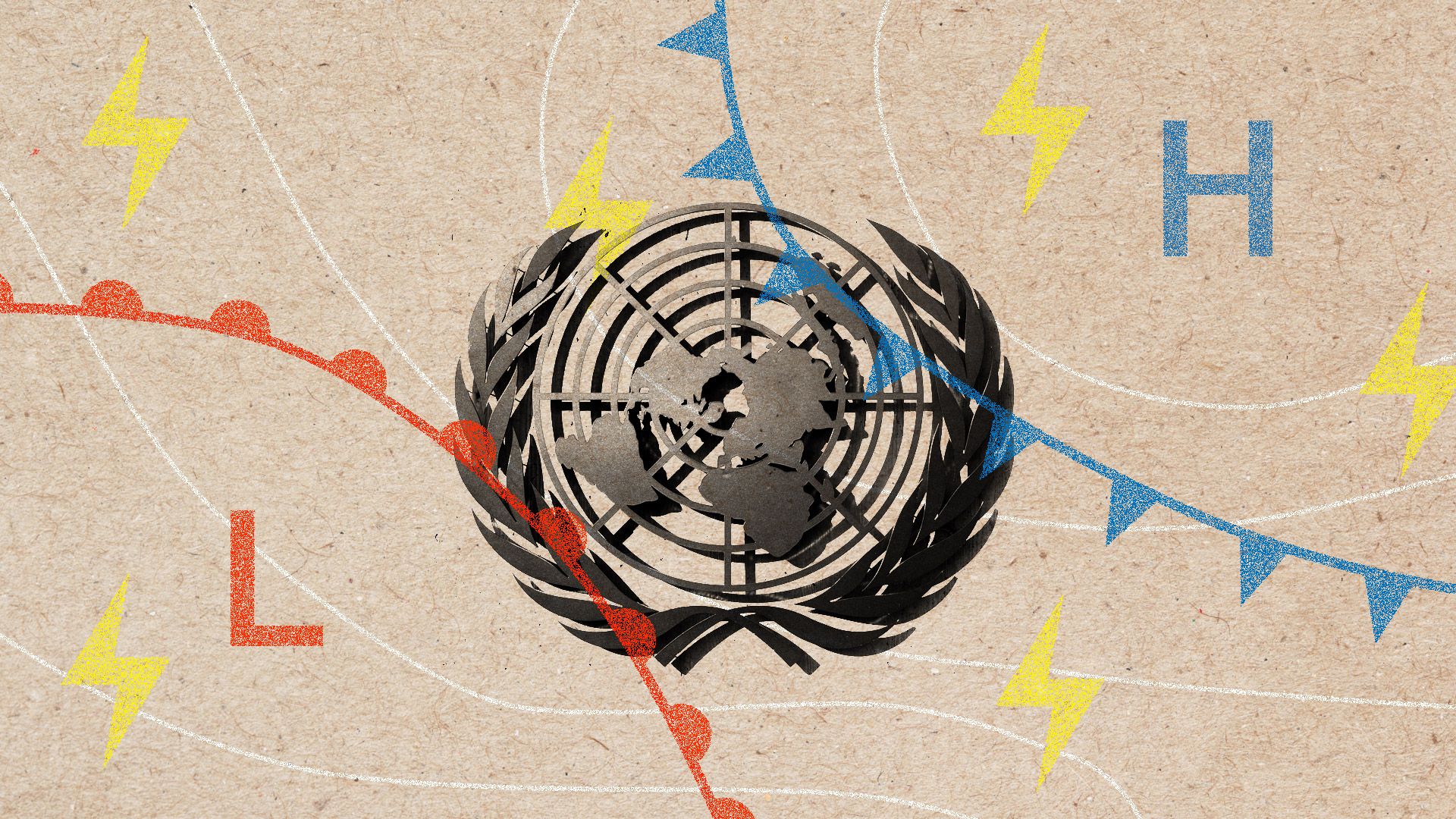October 13, 2018
Welcome back to our quarterly Axios Future Trends, where our subject-matter experts give you an exclusive lookahead. I'd love to hear what you think: Just reply to this email, or write [email protected].
1 big thing: Here come the robotaxis

Illustration: Lazaro Gamio/Axios
By year's end, anyone in metro Phoenix (not just a handful of early participants) will be able to summon an autonomous vehicle from Waymo using an app on their phone. The nation’s first commercial robo-taxi service will be limited to certain areas, but the territory will gradually expand as the cars get even smarter with experience.
Why it matters: Waymo is by far the leader in autonomous vehicle technology, racking up 10 million miles of real-world driving and 5 billion simulated miles. But it’s still up to the public to decide if they want self-driving cars. Waymo’s robo-taxi service will be an early test of that question.
What we’re watching: It’s unlikely we’ll see any movement on federal legislation around AVs this year, unless Congress decides to tackle it during a lame duck session after the November election, which means companies will continue to focus their development efforts in states with the most favorable laws. — Joann Muller
Sign up for Joann's weekly newsletter on autonomous vehicles here.
Tech: Big Tech prepares for privacy rules

Illustration: Lazaro Gamio/Axios
After years of urging regulators to leave them be, Silicon Valley companies are gearing up for new rules, especially around privacy. The industry's focus has shifted from fending off regulation to helping craft something palatable.
- What tech companies would like in return for federal legislation is to see states prohibited from passing their own rules. California has already passed a strict privacy law, set to take effect in 2020, adding additional incentive for tech companies to come to the table on federal legislation.
The rub: Some observers fear that rules protecting user privacy could inadvertently entrench large players. Big companies can build in cost of compliance, while upstarts can find adhering to complex rules prohibitive.
- The model: Europe's General Data Protection Regulation (GDPR) is one possibility. While many tech companies didn't initially love the rules, they're a known quantity that the industry already has to deal with.
- That said: A recent Senate hearing indicated that the tech giants will take any chance they get to influence lawmakers to create rules that are more industry-friendly — that is, weaker — than Europe's or California's. — Ina Fried
Sign up for Ina's daily tech newsletter Login here.
Politics: The Trump election

Illustration: Lazaro Gamio/Axios
Like everything in our lives these days, the midterms on Nov. 6 (just 24 shopping days away) are all about President Trump:
- Trump wants the elections to be about Trump, and makes that plain in the mad rush of rallies heading into voting day.
- The gender gap is off the charts wide — due to Trump.
The House is virtually certain to flip to Democrats for two reasons: insanely high turnout and fundraising among liberals — all in reaction to Trump — and suburban woman snubbing the GOP, also because of Trump.
- Nancy Pelosi is highly likely to then become Speaker, again thanks to Trump. A record number of women will have run, voted and won. It’s hard to see women denying a woman the speakership, especially in the Trump era.
- Kevin McCarthy is highly likely to lead the House GOP post-election, in part because of his tight relationship with Trump — plus his embrace of the Trump border wall and immigration strategy.
The Senate, on the other hand, looks better and better for Republicans to hold. Why? Trump!
- The rural voters who will decide Senate races from North Dakota to Tennessee love Trump — and his us-against-them rallying cry during and after the Brett Kavanaugh hearings.
Be smart: Regardless of the outcome of the House and Senate, it will be all about Trump’s wall in the lame duck, Trump’s impeachment after that, and Trump’s reelection campaign in 2020. —Mike Allen
Subscribe free to "Axios AM: Mike's Top 10," our 7-day-a-week day-starter, and Jonathan Swan's weekly Washington lookahead "Sneak Peek" here.
Health: Trump test for the ACA

Illustration: Lazaro Gamio/Axios
The politics and substantive rules of the road for the Affordable Care Act are more stable now than they have been in years. But chaos is never far away.
What to watch: The upcoming ACA enrollment season, which starts Nov. 1, will be the first one with the Trump administration’s agenda fully in place, and it will test just how effective that agenda is.
- For the first time, the ACA’s individual mandate won’t be in effect, and consumers will actually be able to the buy cheaper, skimpier insurance plans the Trump administration has been positioning as an alternative to ACA coverage.
- Insurers don’t like some of these changes on the merits. But they’ve known all this was coming, and generally feel they have a pretty good handle on how badly these policies will affect the market for ACA coverage. The next enrollment window will tell them whether they guessed correctly.
This period of relative certainty could come undone in court.
- The very early tea leaves suggest that the latest legal challenge to the ACA might have more legs than legal experts initially thought.
- The red states leading that lawsuit want the courts to strike down the entire law; the Trump administration wants them to only strike down protections for pre-existing conditions. Either outcome would plunge health care back into policy and political chaos.
The bottom line: We’re either adjusting to the new normal, or in the calm before the storm. A federal judge in Texas and a six-week enrollment period will tell us which. — Sam Baker
Sign up for Sam's daily Vitals newsletter here.
Future: The populist tide keeps rising

Illustration: Lazaro Gamio/Axios
The more advanced economies had thought the forces of globalization — ever-opening trade and the free movement of people — were inexorable.
- Instead, they have been overwhelmed by the forces of tribal identity — a feeling across the West of a loss of stature, self-dignity, and power over your own destiny.
- In country after country, look for the populist wave to go on for decades.
- And when they are played out, look for the West to be a very different world, although it's difficult to discern even the outlines of what may be coming.
Bottom line: People are angry at their establishment leaders, their institutions, and immigrants. Brazil, Latvia and Serbia are the latest to vote for nationalist leaders promising to kick out the scoundrels. — Steve LeVine
Sign up for Steve's daily Axios Future newsletter here.
World: South America in a storm

Illustration: Lazaro Gamio/Axios
Brazil appears poised to elect Jair Bolsonaro — a longtime backbencher who has spoken fondly of military rule and was best known until recently for his penchant for racist, sexist and homophobic comments — as its next president.
Bolsonaro’s campaign has been fueled by anger over crime, corruption and a sputtering economy. But the fury isn’t contained to Brazil:
- Venezuela’s economic, political and humanitarian crisis has generated an exodus of some 4 million people. The migrant crisis rivals Syria’s, and it’s placing a huge burden on the country’s neighbors. So dire is the situation inside Venezuela, meanwhile, that foreign military intervention is being discussed in earnest.
- Colombia has taken in at least 2 million Venezuelans, exacerbating a tense political situation there. A peace deal polarized the electorate, Coca production is at an all-time high and Iván Duque, the country’s new president, has his work cut out for him.
- Argentina is attempting to claw its way out of a currency crisis. A recession looms and that has undercut the popularity of President Mauricio Macri, a centrist. His predecessor and political rival, though, might be headed to prison.
What to watch: As we've seen from the massive corruption scandals that have reached across borders and affected much of the continent over the past few years, South America’s politics are deeply intertwined. Things tend to unfold in waves. Right now, they’re heading in the wrong direction. — David Lawler
Sign up for David's bi-weekly World newsletter by clicking here.
Business: Next phase of the China trade war

Illustration: Lazaro Gamio/Axios
U.S. tariffs on around $200 billion in Chinese imports are set to jump to 25% on Jan. 1, up from the 10% implemented last month.
- That works out to around $30 billion in new taxes to be paid by U.S. importers, many of whom will pass at least some of the costs on to U.S. consumers.
Be smart: Economics differ on the degree to which increased tariffs will affect things like GDP, corporate earnings, and inflation, but few of the predictions are broadly cataclysmic.
The bigger wildcard is how China will respond. Trump, buoyed by his self-described trade successes with Canada and Mexico, is unlikely to back down before January.
- If Republicans continue to run Congress, Trump will maintain free reign on trade, even if it violates traditional GOP orthodoxy.
- If Democrats gain power, trade may be one area where they largely agree with the White House.
China cannot simply apply 25% tariffs to an equal amount of U.S. imports, because they don't total $200 billion. Other possible options (and, no, this is not an exhaustive list):
- Devalue the yuan, thus turning them into the currency manipulator Trump already says they are.
- Severely restrict Chinese tourism to the U.S., which generated $33 billion in 2016.
- Sell down its trillion dollar-plus stockpile of U.S. Treasury bills, or stop buying new ones. Either one could possibly increase U.S. government borrowing costs.
- Make it much more difficult for U.S. businesses to operate in China, well beyond current concerns about IP theft and requirements that U.S. tech companies form joint ventures with local partners.
The bottom line: Trump has made America’s policy known. China’s response will determine if this becomes a full-blown trade war. — Dan Primack
Sign up for Dan's daily deals newsletter Axios Pro Rata here and Felix Salmon's weekly business lookahead Axios Edge here.
Science: Brain science, Earth science and astronauts

Illustration: Lazaro Gamio/Axios
Cutting-edge developments in neuroscience could come out of a major conference taking place in early November. Scientists have been making gains in everything from understanding addiction to designing treatments to help re-establish brain-body connections, allowing people to use limbs that they had lost to amputations or spinal cord injuries.
- The world's top Earth scientists will meet in Washington in December to present the latest on everything from the future of our climate to a future mission to Mars. Lots of news will come out of this conference, from research into what may have caused the monstrous fire tornado that struck Redding, California in July, to what NASA's Cassini spacecraft learned about Saturn's rings during its recent mission.
SpaceX and Boeing will also be moving closer to the first uncrewed tests of their spacecraft that will eventually take NASA astronauts to the International Space Station.
- This work has taken on a new urgency after the aborted Russian rocket launch to the Space Station on Oct. 11.
- That incident has left the U.S. with no human spaceflight capability for at least a few months, pending an investigation. — Andrew Freedman
Sign up for Andrew's weekly Science newsletter here.
Cybersecurity: A new U.S. cyber strategy

Illustration: Lazaro Gamio/Axios
The new cybersecurity strategy unveiled last month by the Department of Defense emphasizes agility, strength, and the ability to disrupt cyberattacks by hacking the attackers. In the coming months, we'll start to learn whether that makes the U.S. more secure, the world more chaotic, or both.
- The new strategy undoes Obama-era rules that required intra-agency discussions before cyber interventions and lowers the threshold for what warrants a response from U.S. hackers.
Proponents of the strategy believe that the United States needs to raise the cost for foreign hackers to strike American targets, and the current toolkit lacks a military option less extreme than war. In part, the idea is to show U.S. cyber power in an attempt to bolster security.
The risks:
- Responding to cyberattacks can escalate conflicts. Nations may feel like they have to respond to a challenge or may interpret what the U.S. considers a defensive move as part of a larger attack.
- For the U.S. to respond to attacks nimbly, it will have to develop footholds in enemy networks in advance, and that risks exposure. — Joe Uchill
Sign up for Joe's bi-weekly cybersecurity newsletter Axios Codebook here.
Energy: Climate, energy collide in annual U.N. meeting

Illustration: Lazaro Gamio/Axios
The world’s dual attempts at addressing climate change and increasing access to energy are set to clash at an annual United Nations conference.
- Driving the news: A seminal report released Oct. 8 by a U.N. scientific body ahead of the December confab underscored the urgency of climate change and what drastic efforts should be taken to address it.
The intrigue: The conference is being held in Katowice, Poland — a small city known for its history mining coal in a country still heavily dependent upon the resource.
- Coal emits the most carbon dioxide compared to other fossil fuels.
- It has historically been the cheapest and most prevalent electricity option in many countries.
- Coal remains the dominant power source in many of the world’s fastest-growing economies like China and India, which prioritize cheap energy access ahead of environmental concerns.
The details: Negotiators from hundreds of countries, including the U.S., will hash out additional details on the big 2015 climate accord agreed to in Paris.
- Trump administration officials are expected to attend this year’s conference, like they did last year.
- But there's unlikely to be any movement toward reconsidering President Trump’s vow, articulated at a Rose Garden speech in June 2017, to withdraw America from the deal. — Amy Harder
Sign up for the daily Axios energy newsletter Generate by Ben Geman and Amy's weekly Harder Line column here.